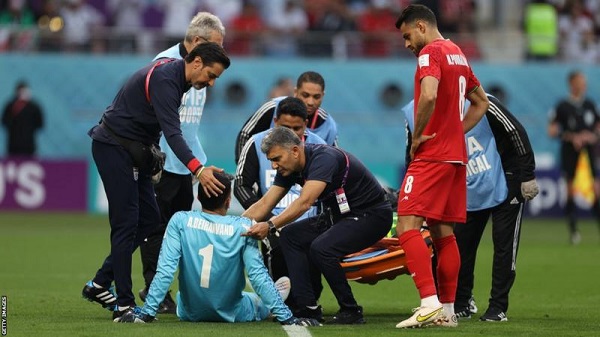We are only two days into this World Cup and already we are seeing a theme developing:
Stoppage-time. And lots of it.
The four games so far have had nearly 65 minutes added on between them, with England's match against Iran lasting an incredible 117 minutes and 16 seconds.
READ ALSO: World Cup 2022: Saudi Arabia come from behind to stun Messi's Argentina
That was partly down to injury - Iran goalkeeper Alireza Beiranvand suffered concussion after a nasty clash of heads early on. But it is also part of a concerted effort by Fifa to clamp down on time-wasting by more accurately monitoring the amount of time the game is stopped.
Reasons the game is halted include injuries, video assistant referee decisions, substitutions, penalties and red cards, with some players often deliberately delaying the restart after such incidents in order to wind down the clock.
#WorldCup2022 match lengths so far:
QAT v ECU: 100:18
ENG v IRN: 117:16 (lol)
SEN v NED: 102:49— Duncan Alexander (@oilysailor) November 21, 2022
#WorldCup2022 match lengths so far:
— Duncan Alexander (@oilysailor) November 21, 2022
QAT v ECU: 100:18
ENG v IRN: 117:16 (lol)
SEN v NED: 102:49
Chairman of Fifa's referees committee Pierluigi Collina confirmed last week that fourth officials had been instructed to keep track of time lost during the game during the tournament in Qatar, something they had also tried to do at the previous World Cup in Russia in 2018.
"In Russia, we tried to be more accurate in compensating for time lost during games and that's why you saw six, seven or even eight minutes added on," he told reporters at a pre-tournament briefing.
"Think about it: if you have three goals in a half, you'll probably lose four or five minutes in total to celebrations and the restart."
The result of this new approach was a number of records being broken.
According to Opta, the four single halves with the most stoppage time in a single World Cup match since records began in 1966 were all on Monday:
- England v Iran first half (14:08 minutes)
- England v Iran second half (13:08)
- USA v Wales second half (10:34)
- Senegal v Netherlands second half (10:03)
Unsurprisingly, all that added time led to some VERY late goals.
Mehdi Taremi's penalty for Iran against England came with 102:30 on the clock, the latest World Cup goal on record excluding extra time.
That was swiftly followed by the second latest, with Davy Klaassen's strike for the Netherlands coming after 98 minutes and 17 seconds.
The approach has certainly caused a stir on social media, with some fans praising Fifa's attempts to clamp down on time-wasting but others feeling it is leading to unnecessarily long games.
Either way, it should make you think twice if you ever consider leaving a match early again. You don't know how much action you will miss.
Enjoying the amount of time that is being added on by the officials at #QatarWorldCup2022 there is too much time wasting in football!
— Jamie Carragher (@Carra23) November 21, 2022
Not in favour of these giant stoppage times.
— Tim Vickery (@Tim_Vickery) November 21, 2022
Grinding the players into the ground. 4 would have been fine. 9? Not for me
98:17 - Davy Klaassen's goal after 98:17 is the second latest World Cup goal on record (since 1966) excluding extra time, after Mehdi Taremi's goal earlier today (102:30). Climax. pic.twitter.com/VkzgzaNupr
— OptaJohan (@OptaJohan) November 21, 2022
BBC





